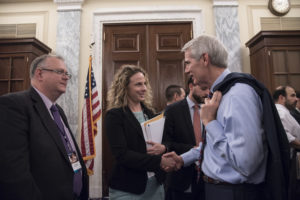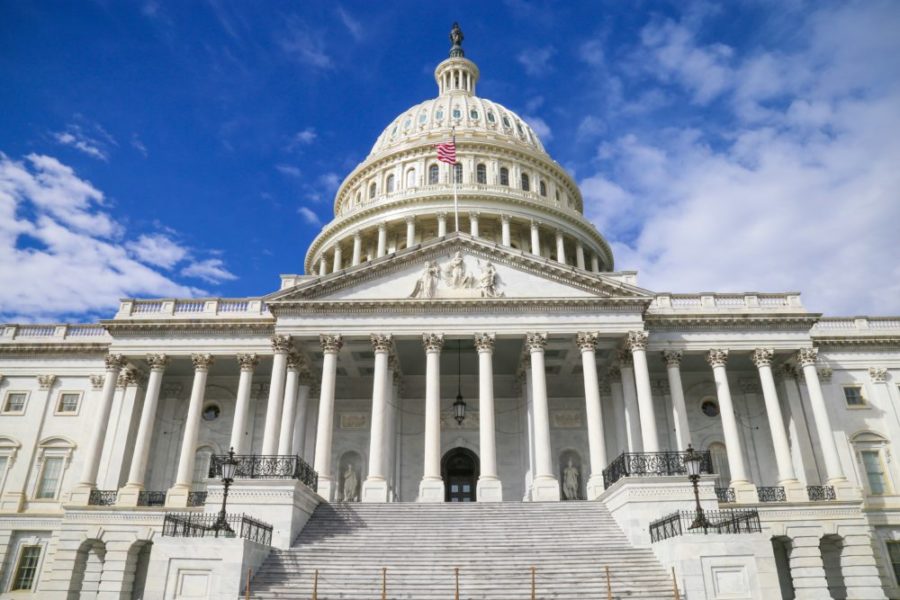For some, lobbyist or lobbying are terms associated with shady dealings or hardball tactics. Not so fast. The lobbyists I have worked with in the arts education arena are highly principled, skilled negotiators and strategic tacticians in the art of garnering influence, as dedicated to the cause of arts education as those of us in the field. They are often the unsung heroes behind the often protracted and winding road of policy advancement.
Please meet Leo Coco, lobbyist and policy advisor to NAMM. Yes, Leo Coco is a great name. And he lives up to it…
 Leo Coco is a senior policy advisor at Nelson Mullins Riley and Scarborough LLP, where he has worked closely with NAMM for over a decade. He represents NAMM before Congress and the U.S. Department of Education. During his almost 25 years of government service, he served in various positions in the U.S. House of Representatives, including Special Assistant to the Democratic Caucus Chairman Gillis Long and Staff Director of the House Subcommittee on the Legislative Process. At the U.S. Department of Education, Coco served as Deputy Assistant Secretary of Intergovernmental and Corporate Affairs, representing the Department as the primary liaison to elected officials, corporations and the general business community. He also served as a senior advisor to the Secretary of Education, Richard Riley.
Leo Coco is a senior policy advisor at Nelson Mullins Riley and Scarborough LLP, where he has worked closely with NAMM for over a decade. He represents NAMM before Congress and the U.S. Department of Education. During his almost 25 years of government service, he served in various positions in the U.S. House of Representatives, including Special Assistant to the Democratic Caucus Chairman Gillis Long and Staff Director of the House Subcommittee on the Legislative Process. At the U.S. Department of Education, Coco served as Deputy Assistant Secretary of Intergovernmental and Corporate Affairs, representing the Department as the primary liaison to elected officials, corporations and the general business community. He also served as a senior advisor to the Secretary of Education, Richard Riley.
Q: Briefly describe your firm and your role as a lobbyist for arts education in public schools.
Leo Coco: I have represented the National Association of Music Merchants (NAMM) since 2004, working as a D.C. lobbyist and policy advisor as related to the Federal role in music and arts education. I have represented nonprofits in the education arena and other clients and now represent NAMM exclusively.
Nelson Mullins is a law firm based in South Carolina and in 18 U.S. cities. I opened up the D.C. office in 2004. Our offices are at 101 Constitution Avenue overlooking the U.S. Capitol. We started as a government relations practice and added traditional law practices over time. There are three types of lobbyists in D.C.—solo operators, lobbying firms, and law firms. We are the latter. I help the client define their position and set policy goals. Before joining the law firm, I spent 25 years working in the House of Representatives and at the U.S. Department of Education. I feel so very lucky to be working with NAMM.
Q: What tools are available to you as a lobbyist? We know about bills/legislative action; what other tools do you use?
Leo Coco:
- Strategically recruit NAMM members to meet with key committee members.
- Provide legislative language. Aid committee members and staff with language that is aligned with current law and serves our policy objectives.
- Bring in delegates from states for an annual “Fly-In” for targeted meetings with committee members. This has been a very successful strategy in educating NAMM members as well as Members of Congress and staff. NAMM members talk about their relationships with the schools, their role in the community, and NAMM’s reach and breadth in business community overall.
- Utilize new research every year, focused on benefits of music. Research is a very powerful tool that we have used to great effect.
- Develop relationships with governors’ offices in D.C. when NAMM members attend the annual NAMM Music Education Advocacy D.C. Fly-In. This year NAMM members will meet with education staff of twenty-nine governors in their D.C. offices. For other delegates we connect them in their states to meet with their governors’ education policy staff. We continue to talk with governors’ offices regarding State plans for ESSA.

National Association of Music Merchants members speak with Sen. Robert Portman (R-OH) during NAMM on May 24, 2017 in Washington, DC. (Photo by Kris Connor/Getty Images for NAMM)
Q: How do you ensure supportive policies follow the intent of the law?
Leo Coco: Follow the money. One of the best things about ESSA is a new grant for subjects defined as well-rounded, e.g., music and arts. Following the authorization of the bill, we look to Congress to fund it adequately. It is important to fund the bill to the level of authorization. ESSA authorized the Title IV, Part A Student Success and Academic Enrichment Grant Programat $1.6 billion; however, it was funded initially at $400 million by Congress. The challenge is to watch what happens in Appropriations, advocate for full funding, and navigate the shift from the education committees to appropriations.
It is dangerous to think there is nothing more to do once a bill is passed. The appropriations process takes place every year with potential for program funding to be increased or decreased. We must be vigilant.
For example, in the FY18 budget, funding for ESSA Title IV, Part A grant program now stands at $1.1 billion, up from the original appropriation of $400 million. Another great success.
Q: How are you positioning music and the arts policy in the current political climate?
Leo Coco: We have an opportunity with the 2018 and 2020 elections. If Democrats do take over either House or Senate, committee membership will change, as well as the percentages of Democrats/Republicans serving on education committees, as well as the leadership and staff. So, we advise staying in touch with all members to maintain relationships in the event of changes in committee make-up as well as getting to know newly elected Members of Congress. ESSA will need to be reauthorized in a few years which could open up new possibilities for policy objectives and funding authorizations, as well as the need to protect current aspects of the law favorable to music and arts education.
Q: Describe what success looks like in your work. Can you give an example of a “win”?
Leo Coco: “Well-rounded” is a phrase that was introduced early on in NAMM’s proposed bill. NAMM got on the page early and was successful in helping to craft critical language in the ESSA bill.
Q: Do you agree that lobbying for arts education (or any issue) is a long game?
Leo Coco: We always say that it’s important to make a commitment to the long haul. The reauthorization of the Elementary and Secondary Act (ESSA) took over 10 years. On behalf of NAMM, we shopped three different pieces of legislation over those 10 years, since 2006. That process meant that we wrote a bill with legislative counsel, submitted it to key members of the policy committee and identified a champion to carry the bill. The last bill we drafted in 2010 was called the “well-rounded education bill.” My advice is to plant seeds early, stay on it, develop relationships and wait for the stars to align.
Q: What do you want arts education advocates to understand about what you do?
Leo Coco: Arts education advocates should understand they have more power than they think. It’s not a huge investment of time and resources, but it’s a powerful one. Understanding that your elected officials are working for you is key. Advocates may find it surprising they are greeted with great respect and taken very seriously. It’s also important to learn from the experience, even if you don’t hear everything you want to hear. The staff is very busy with hundreds of issues in front of them. Advocates can keep the issue alive with follow-ups—thank you notes, shared research, local events and successes. Advocates can also stay informed by relying on the relationships they are making in Congress. Ask questions of them to keep building the relationship.
Q: What is the most important thing for advocates to do to advance arts education at the national level.
Leo Coco: At the Federal level, I’m happy to report that we’re not having to convince Congressional members to believe in the value of arts education. We do need to convince them to become champions and take action in Congress.
Members of Congress are attuned to what constituents are advocating for. They are eager to talk with constituents, and they are listening. That said, don’t forget about the local part of the equation, with the governor’s office, school boards and state representatives.
Overall, I would say this is a good time for music and arts education. We are eager to build on the success of music and arts in ESSA and believe we are strengthening our ability every day to be effective advocates.
Photo of U.S. Capitol by Louis Velazquez on Unsplash





